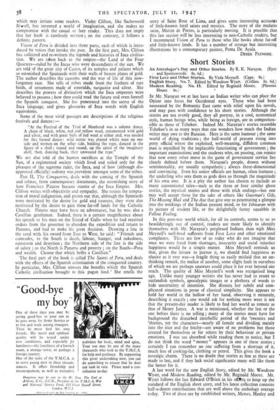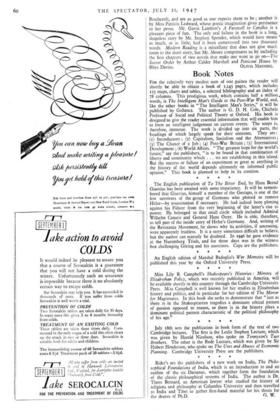Short Stories
House. " 6s.) •
IN Mr. Narayan we at last have an Indian writer who can place the 00ent into focus for Occidental eyes. Those who had been nauseated by the Romantic East came with relief upon his novels, and may pass with confidence to his short stories. Although the stories are not evenly, good, they all portray, in a cool, economical style, human beings who, while being as foreign, are as comprehen- sible as those of Tchekov. Indeed Mr. Narayan's stories resemble Tchekov's in so many ways that one wonders how much the Indian writer may owe to the Russian.- Here is the same humour ; the same world of dying traditions ; the half-world of peasant rising into petty official where the exploited, well-meaning, diffident common man is mystified by the implacable functioning of government ; the important examinations` and the students who, on passing, can rejoice that now every other move in the game of government service lies clearly defined before them. Narayan's people, drawn without sentimentality, are usually sympathetic ; always iltree-dimensional and convincing. Even his senior officials are human, often humane ; the underling who sees them as gods does so through the magnitude of his own awe. It is a pity the author has chosen_ to include so many conventional tales—such as the three or four similar ghost stories, the mystical stories and those with trick endings—but one may well accept those for the sake of others like Gateman's Gift, The Missing Mail and The Axe that give one so penetrating a glimpse into the workings of the Indian peasant mind, or for Ishwaran with its picture of student life, or the delightfully funny squabble in Fellow Feeling.
In this post-war world which, for all its controls, seems to us so bewilderingly out of control, readers are more likely to identify themselves with Mr. Narayan's perplexed Indians than with Miss Meynell's well-bred sufferers from First Love and other emotional complaints. There are few of us today who do not imagine that once we were freed from shortages, insecurity and social injustice happiness would be a sim,ple matter. Miss Meynell reminds us that, given the leisure to loursue it, we should find happiness as elusive as it ever was—a fragile thing so easily mislaid that an un- thinking remark, the malice of another, some slight fault in ourselves of which we are perhaps unaware could place it for ever beyond our reach. The- quality of Miss Meynell's work was recognised long ago. Unlike many younger writers she has never had to resort to outlandish symbols, apocalyptic images or a plethora of words to hide uncertainty of intention. She dissects her subtle and com- plicated situations in prose of classical simplicity. She appears to hold her world in the hollow of her hand, observing it minutely, describing it exactly ; one would ask for nothing more were it not that the present-day reader is likely to find her world as remote as that of Henry- James. A war is mentioned, whether the last or the one before there is no telling ; many of the stories must have for background the disturbed interbellic period of the 'twenties and 'thirties, yet the characters—nearly all female and dividing mainly into the nice and the bitchy—are aware of no problems but those created for themselves or for others by their behaviour or private emotions. I was too absorbed while reading them to notice, but I do not think the word " money " appears in one 'of these stories ; certainly I can remember no one suffering from a shortage of it, much less of cooking-fat, clothing or petrol. This gives the book nostalgic charm. There is no doubt that stories as fine as these are made to last, and if they lack social significance many will like them the better for it.
A last word for the new English Story, edited by Mr. Woodrow Wyatt, and Modern Reading, edited by Mr. Reginald Moore. Mr. Wyatt follows the late Edward O'Brien in his effeltts to keep up the standard of the English short story, and his latest collection contains half-a-dpzen contributions that are well above the anthology average today.. Two of these are by established writers, Messrs. Hanley and
Beachcroft, and are as good as one expects them to be ; another is by Miss Patricia Ledward, whose poetic imagination gives pertinence to her prose. Mr. Gavin Lambert's A Farewell to Candles is a pleasant piece of fun. The only real failure in the book is a long, shapeless story by Mr. Stephen Spender, which would have meant as much, or as little, had it been compressed into two thousand words. Modern Reading is a miscellany that does not give much room to the short story, but Mr. Moore compensates us by including the first chapters of two novels that make one want to go on—The Secret Order by Arthur Calder Marshall and Petticoat House by



































 Previous page
Previous page